#arab american writers
Text

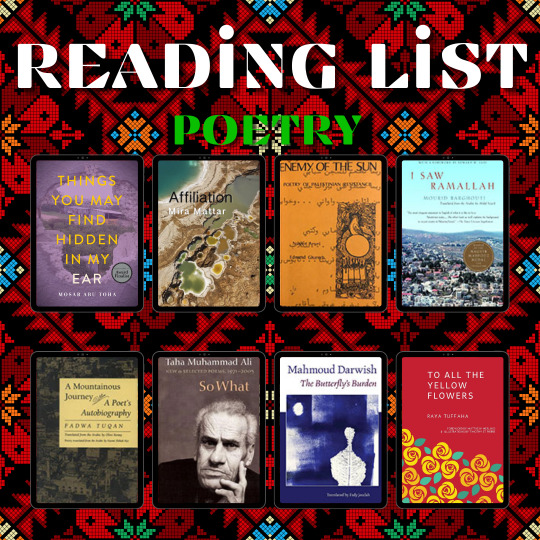
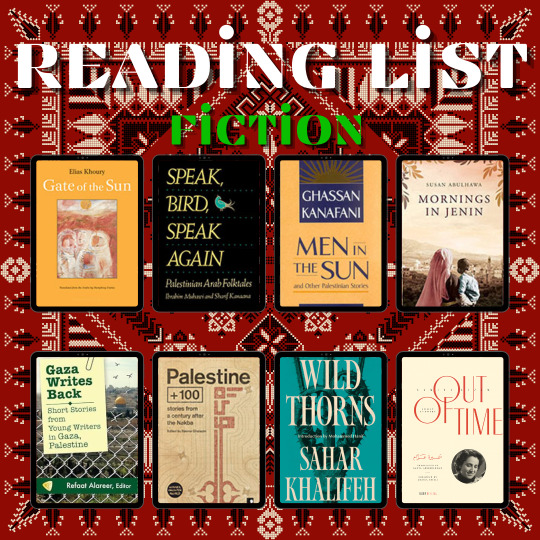
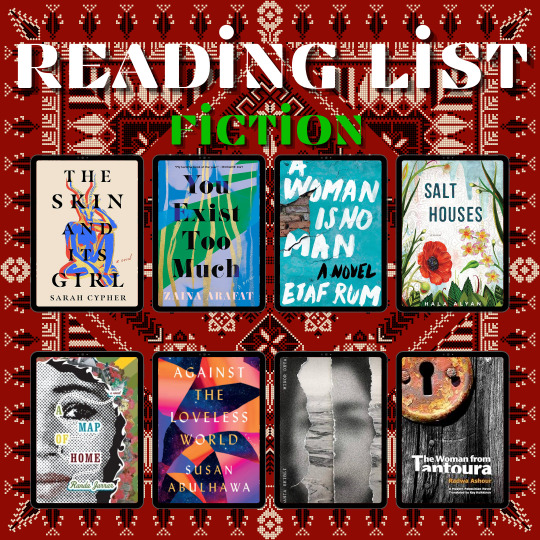
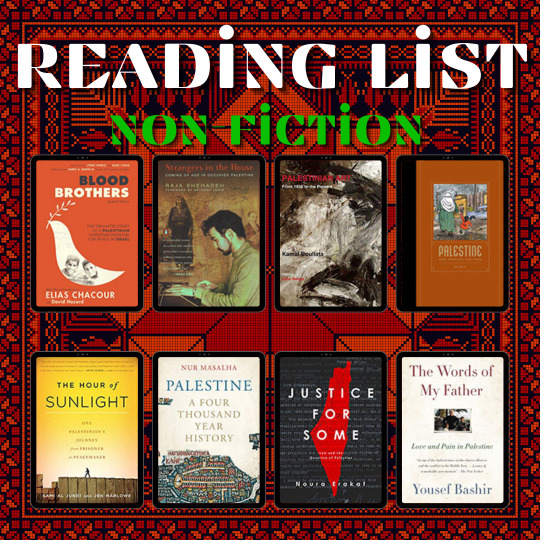

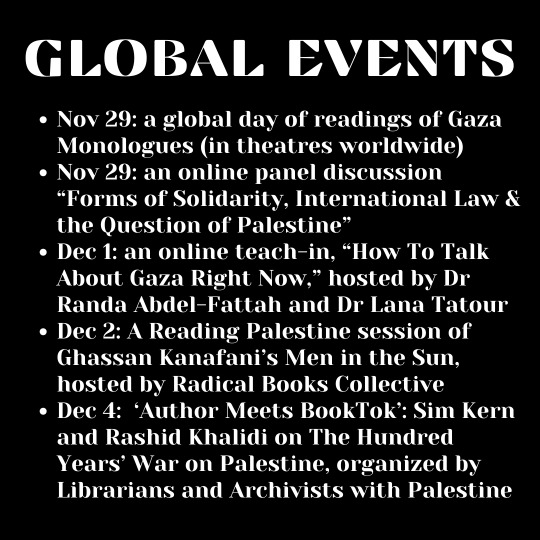
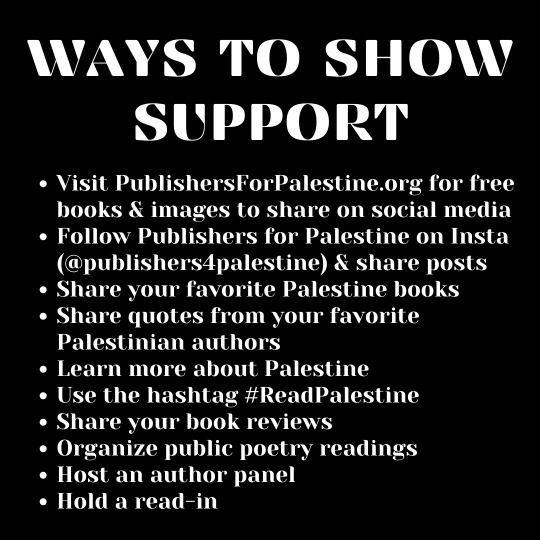
Read Palestine Week
🇵🇸 Good morning, my beautiful bookish bats. Can I start by saying a huge THANK YOU for sharing my Queer Palestinian Book post? Seriously, thank you so much. Let's keep that momentum by observing Read Palestine Week (Nov 29 - Dec 5). I've compiled a list of books to help you, along with a list of upcoming events and resources you can use this week and beyond.
🇵🇸 A collective of over 350 global publishers and individuals issued a public statement expressing solidarity with the Palestinian people. Publishers for Palestine have organized an international #ReadPalestine week, starting today (International Day of Solidarity with the Palestinian People).
🇵🇸 These publishers have made many resources and e-books available for free (with more to come). A few include award-winning fiction and poetry by Palestinian and Palestinian diaspora authors. You'll also find non-fiction books about Palestinian history, politics, arts, culture, and “books about organizing, resistance, and solidarity for a Free Palestine.” You can visit publishersforpalestine.org to download some of the books they have available.
POETRY
🌙 Things You May Find Hidden in My Ear by Mosab Abu Toha
🌙 Affiliation by Mira Mattar
🌙 Enemy of the Sun by Samih al-Qasim
🌙 I Saw Ramallah by Mourid Barghouti
🌙 A Mountainous Journey by Fadwa Tuqan
🌙 So What by Taha Muhammad Ali
🌙 The Butterfly’s Burden by Mahmoud Darwish
🌙 To All the Yellow Flowers by Raya Tuffaha
FICTION
🌙 Gate of the Sun by Elias Khoury
🌙 Speak, Bird, Speak Again: Palestinian Arab Folktales
🌙 Men in the Sun by Ghassan Kanafani
🌙 Morning in Jenin by Susan Abulhawa
🌙 Gaze Writes Back by Young Writers in Gaze
🌙 Palestine +100:Stories from a Century after the Nakba
🌙 Wild Thorns by Sahar Khalifeh
🌙 Out of Time by Samira Azzam
🌙 The Skin and Its Girl by Sarah Cypher
🌙 You Exist Too Much by Zaina Arafat
🌙 A Woman is No Man by Etaf Rum
🌙 Salt Houses by Hala Alyan
🌙 A Map of Home by Randa Jarrar
🌙 Against the Loveless World by Susan Abulhawa
🌙 Minor Detail by Adania Shibli
🌙 The Woman From Tantoura by Radwa Ashour
NON-FICTION
🌙 Blood Brothers by Elias Chacour
🌙 Strangers in the House: Coming of Age in Occupied Palestine by Raja Shehadeh
🌙 Palestinian Art, 1850–2005 by Kamal Boullata
🌙 Palestine by Joe Sacco
🌙 The Hour of Sunlight: One Palestinian’s Journey from Prisoner to Peacemaker by Sami Al Jundi & Jen Marlowe
🌙 Palestine: A Four Thousand Year History by Nur Masalha
🌙 Justice for Some: Law and the Question of Palestine by Noura Erakat
🌙 The Words of My Father: Love and Pain in Palestine by Yousef Khalil Bashir
🌙 Traditional Palestinian Costume: Origins and Evolution by Hanan Karaman Munayyer
🌙 Mountain against the Sea: Essays on Palestinian Society and Culture by Salim Tamari
🌙 This Is Not a Border: Reportage and Reflection from the Palestine Festival of Literature
🌙 We Could Have Been Friends, My Father and I: A Palestinian Memoir, by Raja Shehadeh
🌙 Les échos de la mémoire. Une enfance palestinienne à Jérusalem, by Issa J. Boullata
🌙 A Party For Thaera: Palestinian Women Write Life In Prison
🌙 Light in Gaza: Writings Born of Fire,
🌙 Voices of the Nakba: A Living History of Palestine
#free palestine#save palestine#books#book list#book recs#book recommendation#booklr#book blog#batty about books#battyaboutbooks#arab american heritage month#arab american writers#palestinian writers#palestinian poetry#poetry#poetry books#nonfiction#fiction books#queer fiction#queer community#queer books#muslim writers#read palestine week
208 notes
·
View notes
Text
Nader’s traditions provide a focus for Arab American Heritage Month
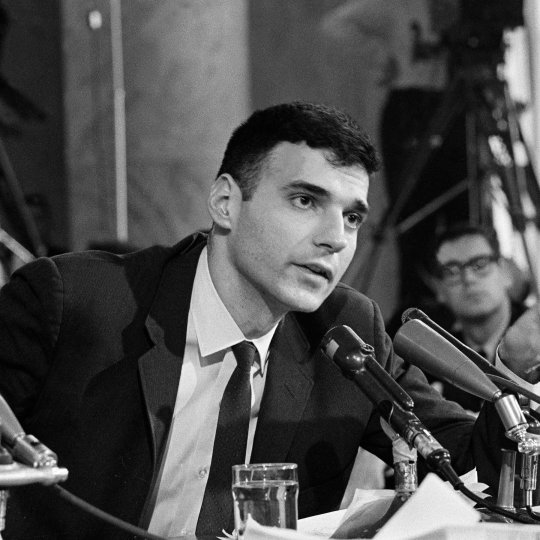
Ralph Nader is known for his lifetime of progressive activism and fearless critique. Yet in this fresh and inspiring book The Seventeen Traditions: Lessons from an American Childhood, Nader takes a look backward - at a serene and enriching childhood spent in bucolic Winsted, Connecticut.
From listening to learning, from patriotism to argument, from work to simple enjoyment, Nader revisits seventeen traditions he learned from his parents, his siblings, and the people in his community, and draws from them inspiring lessons for today's society.
Blending memoir and thoughtful inspiration, Nader offers readers a chance to look back on a time in American history when the family and the natural world were central in a child's understanding of how to be a conscientious adult.
In his warmest and most personal writing to date, Nader fondly describes his father's restaurant business and how it taught him about work, community, how to share in the spirit of others, along with the value of his mother's Lebanese cooking and how it defined his relationship with his heritage.
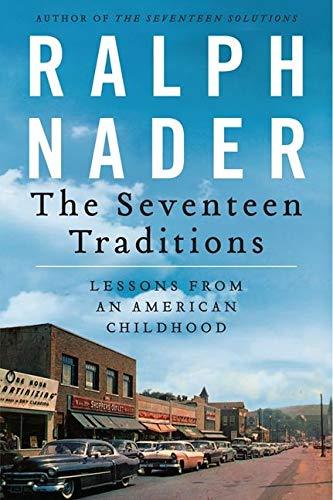
#Ralph Nader#arab american heritage month#arab americans#arabic#usa#book club#books#Conneticut#lebanon#Lebanese#reading#books and reading#manchester#young people#Social media#news#arab american national museum#uk news#writers on tumblr#tumblr
11 notes
·
View notes
Link
I wanted mint leaves, so I bought a plant. I wanted more light, so I opened the windows and bought more plants still. An excuse, I told myself. A promise I will keep. I wanted to know how to keep something alive. I thought this might feel like power.
Looking for inspiration, I asked my father about his garden back home. The date palms and lemon trees. Fat-bodied figs and tendrilled bougainvillea. Sometimes, he said, Israeli soldiers will cut down acres of Arab olive trees just because. It felt odd to consider plant life political. I imagined my father climbing a date tree, pickling turnips, weeding a wide bed of something — knowing which green should live and which green should not. I imagined his hands uprooting something. I wanted that kind of discernment.
Keep reading
3 notes
·
View notes
Text
In the absence of a clear and obvious angle to attack Bushnell’s protest, most likely due to his status as a serviceman that would make outright insulting him or suppressing the news itself scandalous, discussions on Western shores have now taken on the familiar framing of mental illness. In Time Magazine’s write-up of Bushnell’s death, the article finishes with a link to the suicide hotline, and asks readers to contact mental health providers if they are experiencing a “crisis.” Mark Joseph Stern, a writer at Slate, seemingly unasked, also wrote on Twitter/X:
“I strongly oppose valorizing any form of suicide as a noble, principled, or legitimate form of political protest. People suffering mental illness deserve empathy and respect, but it is wildly irresponsible to praise them for using a political justification to take their own life.”
Conviction does not exist to the American. To be willing to die in a selfless act for what they believe in only exists for those outside America's sphere of influence. Many will recall reporting on those who self-immolated in protest in Iran and in Russia for instance where this sort of approach, unwilling to engage with the root of its cause, would not even be entertained, let alone written and published with sincerity. The Arab Spring began with a self-immolation. The self-immolation of Buddhist monks in protest of South Vietnam’s persecution became defining images of the war and its corruption. Within America’s walls however, there is a belief, unspoken and ingrained from birth, that democracy allows for everyone’s voices to be heard and that its representatives are inherently inclined to respond to the people and their widespread wishes.
Desperation at inaction or complicity in terror and atrocity need not apply. Everyone incensed by their government to such an extent must simply have something wrong with them. To be able to go about one’s day knowing that children are screaming from the hunger that is eating their insides and that pregnant women are eating bread made from animal feed, and that the United States is supporting Israel’s creation of this famine, is apparently the real sign of well-adjustment.
Seamus Malekafzali, “The Words Burned Through His Throat: The Sacrifice of Aaron Bushnell,” February 26, 2024.
16K notes
·
View notes
Text
A Multifaceted, Multicultural Identity: Visual Texts About the Experiences of Children of Immigrants
Children of immigrants, particularly first generation and second generation, have a unique struggle with identity.
Continue reading Untitled

View On WordPress
#ap lang discussion topic#ap lang project ideas#ap lang teaching tips#ap lang video argument#asian american students#asian american texts#children of immigrants#diversify classroom#first generation immigrant#japanese american texts#lessons on identity#multicultural texts#poem by arab writer#poetry lesson#slam poetry lesson#texts by asian writers
0 notes
Text
poetry outlets that support a free palestine
after finding out that the poetry foundation/POETRY magazine pulled a piece that discussed anti-zionism because they "don't want to pick a side" during the current genocide, i decided to put together a list of online outlets who are explicitly in solidarity with palestine where you can read (english-language) poetry, including, except where otherwise stated, by palestinian poets!
my criteria for this is not simply that they have published palestinian poets or pro-palestine statements in the past; i only chose outlets that, since october 7, 2023, have done one of the following:
published a solidarity statement against israeli occupation & genocide
signed onto the open letter for writers against the war on gaza and/or the open letter boycotting the poetry foundation
published content that is explicitly pro-palestine or anti-zionist, including poetry that explicitly deals with israeli occupation & genocide
shared posts that are pro-palestine on their social media accounts
fyi this is undoubtedly a very small sample. also some of these sites primarily feature nonfiction or short stories, but they do all publish poetry.
outlets that focus entirely on palestinian or SWANA (southwest asia and north africa) literature
we are not numbers, a palestinian youth-led project to write about palestinian lives
arab lit, a magazine for arabic literature in translation that is run by a crowd-funded collective
sumuo, an arab magazine, platform, and community (they appear to have a forthcoming palestine special print issue edited by leena aboutaleb and zaina alsous)
mizna, a platform for contemporary SWANA (southwest asian & north africa) lit, film, and art
the markaz review, a literary arts publication and cultural institution that curates content and programs on the greater middle east and communities in diaspora
online magazines who have published special issues of all palestinian writers (and all of them publish palestinian poets in their regular issues too)
fiyah literary magazine in december 2021, edited by nadia shammas and summer farah (if you have $6 usd to spare, proceeds from the e-book go to medical aid for palestinians)
strange horizons in march 2021, edited by rasha abdulhadi
the baffler in june 2021, curated by poet/translators fady joudah & lena khalaf tuffaha
the markaz review has two palestine-specific issues, on gaza and on palestinians in israel, currently free to download
literary hub featured palestinian poets in 2018 for the anniversary of the 1948 nakba
adi magazine, who have shifted their current (october 2023) issue to be all palestinian writers
outlets that generally seem to be pro-palestine/publish pro-palestine pieces and palestinian poetry
protean magazine (here's their solidarity statement)
poetry online (offering no-fee submissions to palestinian writers)
sundog lit (offering no-fee submissions to palestinian writers through december 1, 2023)
guernica magazine (here's a twitter thread of palestinian poetry they've published) guernica ended up publishing a zionist piece so fuck them too
split this rock (here's their solidarity statement)
the margins by the asian-american writers' workshop
the offing magazine
rusted radishes
voicemail poems
jewish currents
the drift magazine
asymptote
the poetry project
ctrl + v journal
the funambulist magazine
n+1 magazine (signed onto the open letter and they have many pro-palestine articles, but i'm not sure if they have published palestinian poets specifically)
hammer & hope (signed onto the letter but they are a new magazine only on their second issue and don't appear to have published any palestinian poets yet)
if you know others, please add them on!
4K notes
·
View notes
Text
IMAGE DESCRIPTION ADDED. REBLOG THIS VERSION AND THANK YOU @lab-labrava FOR WRITING IT!
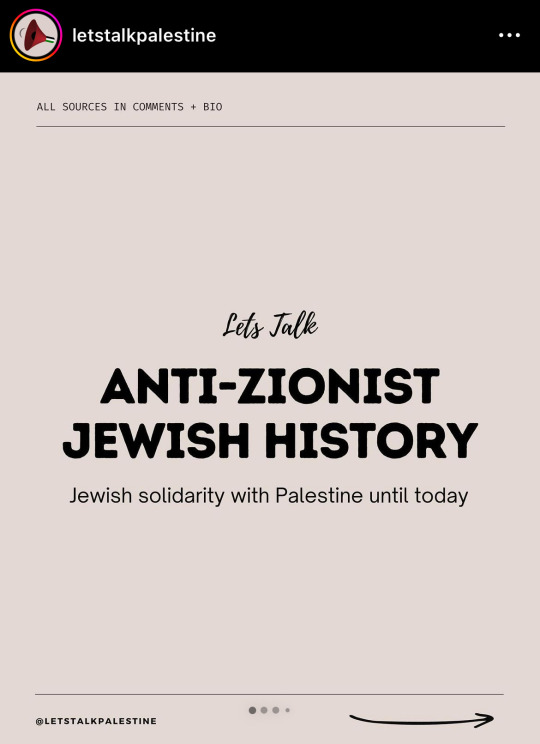
ID: An infographic from the Instagram account @letstalkpalestine consisting of 10 slides.
Image 1: The title page of the infographic. The text says: "Let's talk Anti-Zionist Jewish History." A smaller subtitle underneath the title says: "Jewish solidarity with Palestine until today." End ID.
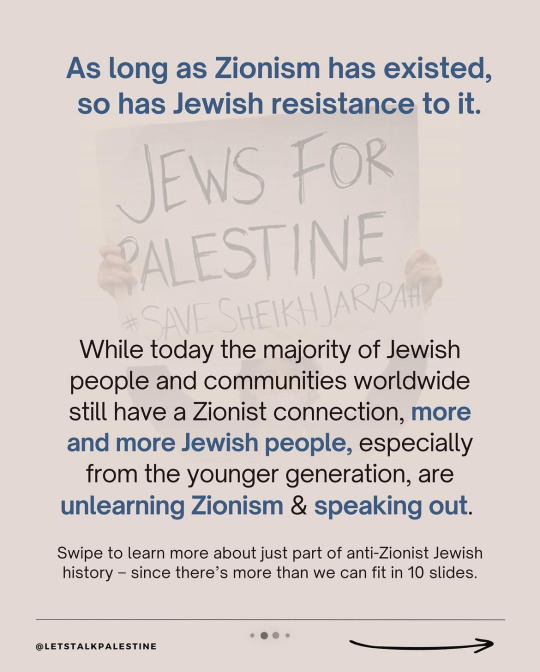
Image 2: The infographic continues to the next panel. The text says, "As long as Zionism has existed, so has Jewish resistance to it. While today the majority of Jewish people and communities worldwide still have a Zionist connection, more and more Jewish people, especially from the younger generation, are unlearning Zionism & speaking out. Swipe to learn more about just part of anti-Zionist Jewish history - since there's more than we can fit in 10 slides." A semi-transparent image is overlayed in the background, of someone holding up a sign that reads: Jews for Palestine! #Free Sheik Jarrah. End ID.
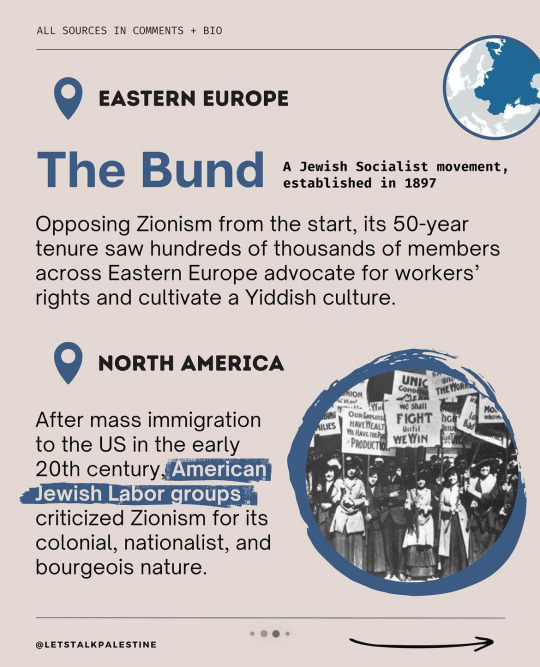
Image 3: Icon of a location tag next to the words Eastern Europe. In large, blue text is the word "The Bund" and the subtitle describing what it is, "A Jewish Socialist movement, established in 1987."
The following paragraph says, "Opposing Zionism from the start, its 50-year tenure saw hundred of thousands of members across Eastern Europe advocate for workers' rights and cultivate a Yiddish culture."
Location tag and the title, "North America." The paragraph says, "After mass immigration to the US in the early 20th century, [American Jewish Labor groups] (highlighted in chalky blue and bold white text) criticized Zionism for its colonial, nationalist, and bourgeois nature." Next to this text, is a circle with women protestors holding up signs. End ID.
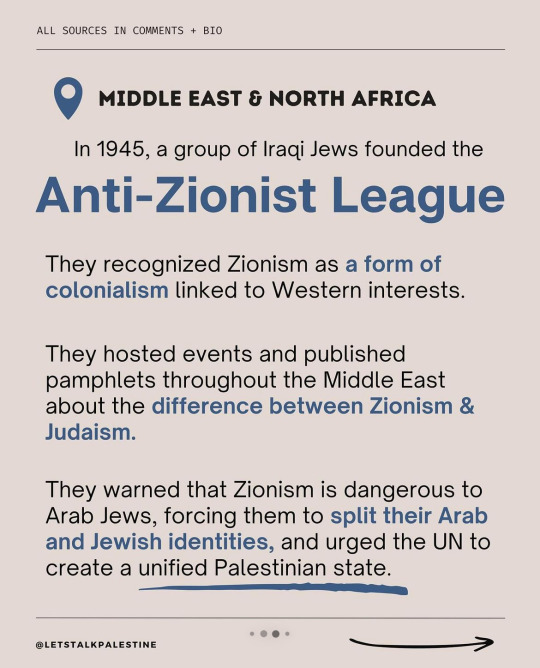
Image 4: The title, "Middle East and North Africa." The paragraph states, "In 1945 a group of Iraqi Jews founded the Anti-Zionist League. They recognized Zionism as a form of colonialism linked to Western Interests.
They hosted events and published pamphlets throughout the Middle East about the difference between Zionism & Judaism.
They warned that Zionism is dangerous to Arab Jews, forcing them to split their Arab and Jewish identities, and urged the UN to create a unified Palestinian state.
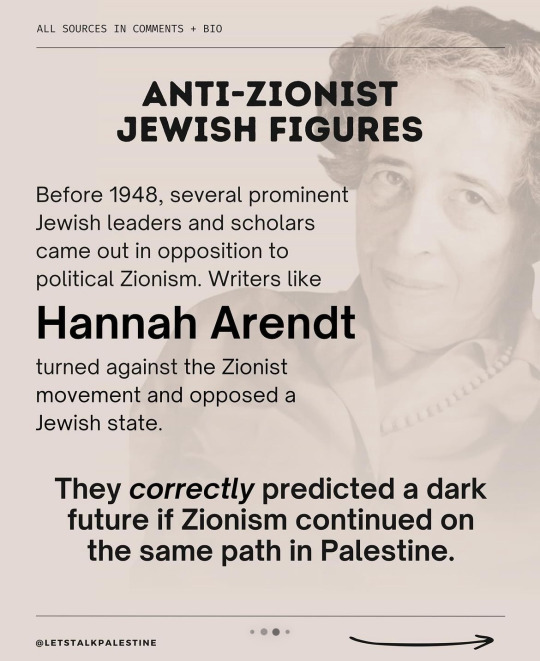
Image 5: The panel is titled, "Anti-Zionist Jewish figures." A faded image of Hannah Arendt's visage is in the background. Overlayed on top, the following paragraphs discuss her. "Before 1948, several prominent Jewish leaders and scholars came out in opposition to political Zionism. Writers like Hannah Arendt turned against the Zionist movement and opposed a Jewish state.
They correctly predicted a dark future if Zionism continued on the same path in Palestine. End ID.
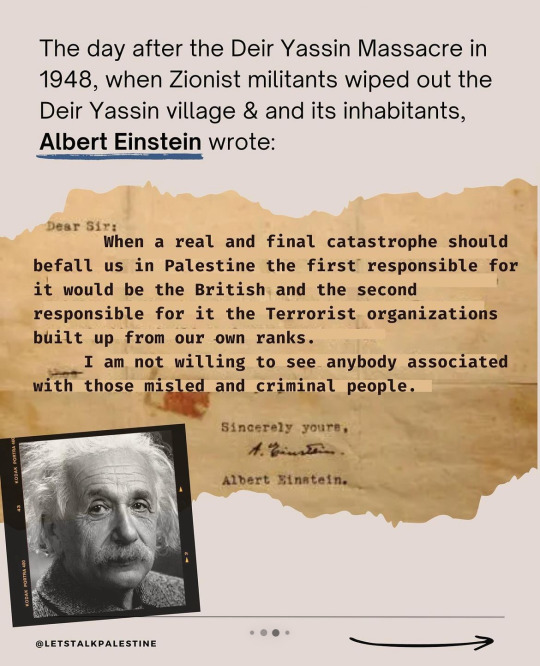
Image 6: The day after the Deir Yassin Massacre in 1948, when Zionist militants wiped out the Deir Yassin village & its inhabitants, Albert Einstein wrote:
"When a real and final catastrophe should befall us in Palestine the first responsible for it would be the British and the second responsible for it the Terrorist organizations built up from our own ranks. I am not willing to see anybody associated with those misled and criminal people." The former paragraphs are imposed against a tan, parchment fragment, in typewriter font, and the letter ends with Sincerely yourn, Albert Einstein, both his signature and typed name. End ID.
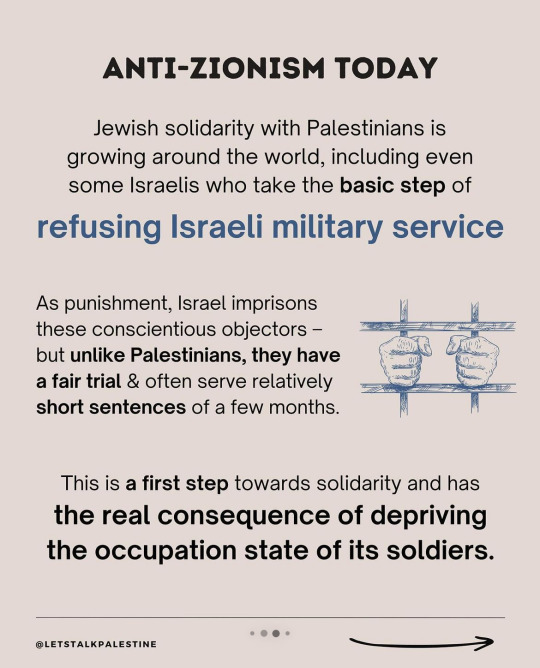
Image 7: Titled "Anti Zionism Today." Blue sketchy image of someone's hand gripping jail bars breaks up the following paragraphs which say: Jewish solidarity with Palestinians is growing around the world, including even some Israelis who take the basic step of refusing Israeli military service.
As punishment, Israel imprisons these conscientious objectors — but unlike Palestininas, they have a fair trial & often severe relatively short sentences of a few months .
This is a first step towards solidarity and has the real consequence of depriving the occupation state of its soldiers. End ID.

Image 8: Titled "Israel's Crackdown on Jewish Anti-Zionism" Behind this text are a picture of handcuffs. In the corner is a picture of Jonathan Pollak. The following text says: Jonathan Pollak is a Jewish Israeli and long-time anti-Zionist activist. Israel has detained him several times, most recetly in January as he protested with Palestinians in Beita, (a Palestinian village) for allegedly throwing stones.
Jonathan has been violently attacked for his activism. In 2018, Jonathan was slashed across the face by settlers who ambushed him outside his workplace. Earlier, in 2005, Israeli soldiers shot a tear gas canister. directly at him, causing internal bleeding in his brain." End ID.
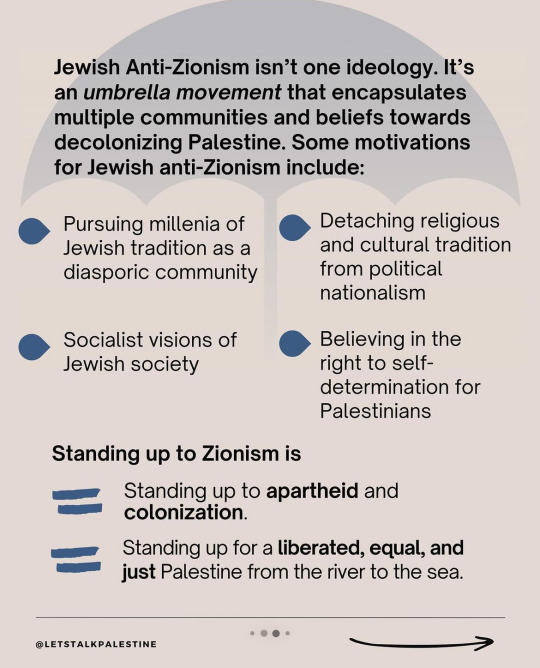
Image 9: Semi-transparent image of an umbrella behind the title text is "Jewish Anti-Zionism isn’t one ideology. It’s an umbrella movement that encapsulates multiple communities and beliefs towards decolonizing Palestine. Some motivations or Jewish anti-Zionism include:
1. Pursuing millenia of Jewish tradition as a diasporic community
2, Detachibng religious and cultural tradition from political nationalism.
3. Socialist visions of a Jewish Society.
4. Believing in the right to self-determination for Palestinians
Standing up to Zionism is:
1. Standing up to apartheid and colonization.
2. Standing up for a liberated, equal, and just Palestine from the river to the sea.
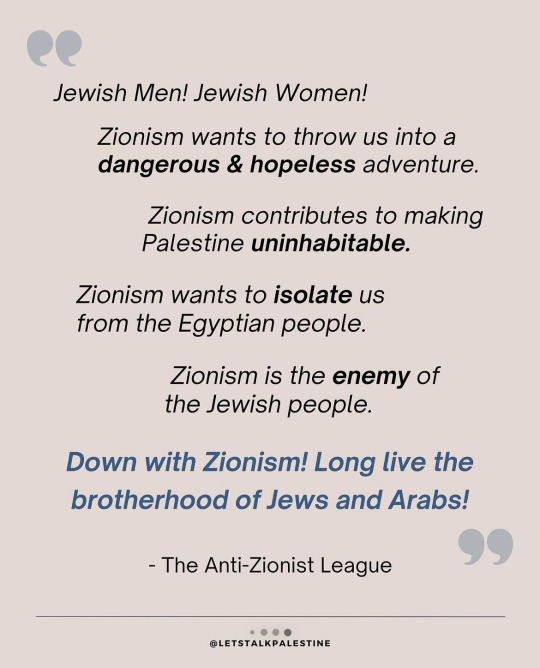
Image 10: An ending quote, and call to action, by the Anti-Zionist League. It says: "Jewish Men! Jewish Women! Zionism wants to throw us into a dangerous & hopeless adventure. Zionism contributes to making Palestine uninhabitable. Zionism wants to isolate us from the Egyptian people. Zionism is the enemy of the Jewish people. Down with Zionism! Long live the brotherhood of Jews and Arabs!" --The Anti-Zionist League. End ID.
#israel#jewish#jews#jumblr#palestine#resources#history#resistance#genocide#instagram#ethnic cleansing#activism#zionism#anti zionism#socialism#colonialism#colonization#judaism#free palestine
1K notes
·
View notes
Text
academia is often used as the forefront of much of the violence inflicted on palestinians — for example in the library of congress, there is a collection called "the american colony of jerusalem" with racist photography and items that help visually perpetuate the "people without a land, land without a people" part of herzel's ideology, which itself is the forefront of much of zionist ideology. pointing out the systematic harm in academia is often considered "irrelevant" by zionists.... denies the origins of zionism as a political and academic ideology with physical consequences.
much of palestinian history throughout the last century has to do with erasure and silencing — that is how we got to this point. when i say no one listened to palestinians i mean NO ONE listened. they were ignored. all their demands were unreasonable. instead they get blamed for much of the world's unwillingness to listen. even my family members — i have stories of their work in academic resistance since '48. and some of them are well known contributions throughout euro-american and swana society. yet they're still ignored because of their palestinian origin.
"if you were just more reasonable" or "if you took the time to listen with compassion" or "you have to appeal to people's sense of reason" ignores the fact of the matter — this ideology's founding principals were built on "a people without a land for a land without a people." you cannot and should not ignore that. in order to complete the zionist ideology, you must remove the native population. therefore any subscribers to the idea of zionism are violent, whether they intend it or not.
and if it were true, that academia were irrelevant.... then that doesn't explain the systematic torture and imprisonment of writers and scholars, the exile of my family members who were journalists and activists, the captivity of friends for no other reason than they were deemed a threat by some list or the other.
oftentimes zionists, or zionist sympathizers, ignore our (diaspora's) material ties to the occupation and dismiss us as being "disconnected" from the "situation" in Palestine and "misunderstanding" or "misconstruing" israeli society. what am i misunderstanding exactly? that the origins of this "country" relies on violent displacement and exile? that for the past 75 years, that violence has not stopped once? that no matter what we say about the violence of zionism as an intrinsic aspect, it takes a secondary seat to the imagined realities of zionism?
therefore, anti-zionism is the logical conclusion for valuing palestinian lives. but what are the arguments against anti-zionism? that arab governments expelled jews from SWANA? do you think that's a result of anti-zionism? then you must not understand that palestinians are often treated poorly by the same governments that claim to have done this in the name of "anti-zionism," living in poverty in refugee camps, tortured and arrested, even in some cases exiled by governments. this also neglects to mention zionist collaboration with said governments to exile the jews of their lands.
so then, what?
if anti-zionism is the rejection of the settler colonial state of israel, which you must admit to be truly anti-zionist, then it is an exclamation of palestinian sovereignty and identity. so when you say anti-zionism and antisemitism are linked.... do you realize what you are implying? do you realize that zionism, the root cause of palestinian suffering, is the reason for our expulsion and displacement? so then when you write academic thinkpieces about the "complexity" of zionism, do you realize the harm you're doing? do you realize that this, in fact, is not a new or useful argument? that i've seen iterations of it for years and years? that at the core, the zionist ideology relies on this muddying of the waters for you to not do anything?
to be frank, your constant reminding of the complexity of zionism when people in palestine are suffering from the material effects of it only scream, to me, utter contempt and selfishness. zionism is violence, to me and my family. it is violence for every palestinian in this world. you must admit that to be a sincere advocate for palestinians, otherwise your words ring hollow. the present reality outweighs any possibilities.
722 notes
·
View notes
Text
Laswell Appreciation Post

Can we talk about how amazing this woman is for a moment?
Laswell is a high level intelligence analyst with over a decade of experience in and off the field. Her acumen for statecraft and spyfare is incredible. This woman graduated Suma Cum Laude from Cornell, has a Master's degree in strategic intelligence analysis and studied Near East linguistics at the American University of Beirut. She speaks fluent Arabic, knows her way around weapons, and once broke a terrorist's neck with her bare hands.
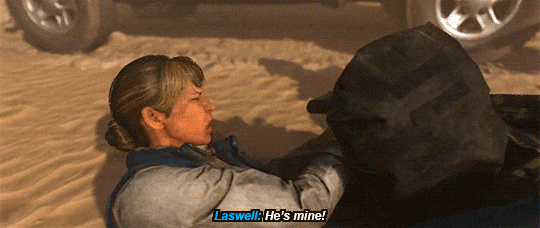
(LOOK AT HER!)
Her bio says that Laswell rewrote the book on unconventional information warfare, climbed the ranks and became her own female mentor. She's survived a terrorist bombing, became a station chief, refused to testify before a senate hearing, was in charge of a SAD blacksite, and has been credited with saving tens of thousands of lives.
-and that's just the stuff from her bio.
Laswell is a support character during the entire series, but without her the entire story would crumble. Laswell is the one to recruit Price to find the missing Russian chemicals in MW2019. She is the one to find Hassan in MW2022. She is the one who went out in the field herself to see the job is done correctly. All of the information that 141, Alex and Farah, and Los Vaqueros act upon comes directly from Laswell. Hell, this woman got captured by Al-Qatala in the process of trying to find the missing missiles. Laswell is the one to find out how Shadow Company and Shepherd lost them in the first place. She's the one who tugs on the Russian thread and reveals the villain of MW2023, Makarov.
Laswell's achievements are often overshadowed by the plot and gameplay, but goddamn is she such a great example of a powerful female character, and an older one at that! (Note, older refers to being older than many female heroines in their 20's, not to be confused with being old.) I can't think of an instance in any of the games where she is sexualized or objectified, and even when she is kidnapped she's shown not as a damsel in distress, but as a woman who can hold her own as soon as the time is right. Plus, what does she do immediately after being rescued? Goes straight back to business and figures out the real root of the campaign.
I admit I'm fairly surprised to see such a well written female character in a series that historically caters to men. The writers for the game did a fantastic job in creating an absolutely amazing character who is skilled, well-rounded, and extremely compelling. Please hear it for the queen herself!
Also gay rights to Laswell and her wife specifically 💅

766 notes
·
View notes
Text
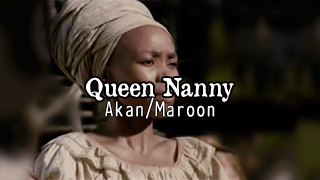

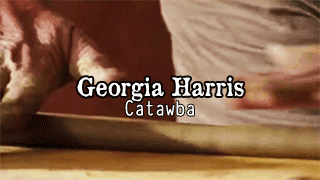


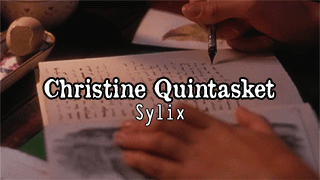


Historical Indigenous Women & Figures [6]:
Queen Nanny: the leader of the 18th century Maroon community in Jamaica, she led multiple battles in guerrilla war against the British, which included freeing slaves, and raiding plantations, and then later founding the community Nanny Town. There are multiple accounts of Queen Nanny's origins, one claiming that she was of the Akan people from Ghana and escaped slavery before starting rebellions, and others that she was a free person and moved to the Blue Mountains with a community of Taino. Regardless, Queen Nanny solidified her influence among the Indigenous People of Jamaica, and is featured on a Jamaican bank note.
Karimeh Abboud: Born in Bethlehem, Palestine, Karimeh Abboud became interested in photography in 1913 after recieving a camera for her 17th birthday from her Father. Her prestige in professional photography rapidly grew and became high demand, being described as one of the "first female photographers of the Arab World", and in 1924 she described herself as "the only National Photographer".
Georgia Harris: Born to a family of traditional Catawba potters, Harris took up pottery herself, and is credited with preserving traditional Catawba pottery methods due to refusing to use more tourist friendly forms in her work, despite the traditional method being much more labour intensive. Harris spent the rest of her life preserving and passing on the traditional ways of pottery, and was a recipient of a 1997 National Heritage Fellowship awarded by the National Endowment for the Arts, which is the highest honor in the folk and traditional arts in the United States.
Nozugum: known as a folk hero of the Uyghur people, Nozugum was a historical figure in 19th century Kashgar, who joined an uprising and killed her captor before running away. While she was eventually killed after escaping, her story remains a treasured one amongst the Uyghur.
Pampenum: a Sachem of the Wangunk people in what is now called Pennsylvania, Pampenum gained ownership of her mother's land, who had previously intended to sell it to settlers. Not sharing the same plans as her mother, Pampenum attempted to keep these lands in Native control by using the colonial court system to her advantage, including forbidding her descendants from selling the land, and naming the wife of the Mohegan sachem Mahomet I as her heir. Despite that these lands were later sold, Pampenum's efforts did not go unnoticed.
Christine Quintasket: also known as "Humishima", "Mourning Dove", Quintasket was a Sylix author who is credited as being one of the first female Native American authors to write a novel featuring a female protagonist. She used her Sylix name, Humishima, as a pen name, and was inspired to become an author after reading a racist portrayal of Native Americans, & wished to refute this derogatory portrayal. Later in life, she also became active in politics, and helped her tribe to gain money that was owed them.
Rita Pitka Blumenstein: an Alaskan Yup'ik woman who's healing career started at four years old, as she was trained in traditional healing by her grandmother, and then later she became the first certified traditional doctor in Alaska and worked for the Alaska Native Tribal Health Consortium. She later passed on her knowledge to her own daughters. February 17th is known as Rita Pitka Blumenstein day in Alaska, and in 2009 she was one of 50 women inducted into the inaugural class of the Alaska Women's Hall of Fame
Olivia Ward Bush-Banks: a mixed race woman of African American and Montaukett heritage, Banks was a well known author who was a regular contributor to the the first magazine that covered Black American culture, and wrote a column for a New York publication. She wrote of both Native American, and Black American topics and issues, and helped sculptor Richmond Barthé and writer Langston Hughes get their starts during the Harlem Renaissance. She is also credited with preserving Montaukett language and folklore due to her writing in her early career.
part [1], [2], [3], [4], [5] Transphobes & any other bigots need not reblog and are not welcome on my posts.
298 notes
·
View notes
Text
The great fault of the global left is not that it supports Hamas. For how could Western left-wing movements or left-inclining charities or academic bodies truly support Hamas if they were serious about their politics?
No one outside the most reactionary quarters of Islam shares Hamas’s aim of forcing the peoples of the world to accept “the sovereignty of Islam” or face “carnage, displacement and terror” if they refuse. You cannot be a progressive and campaign for a state that executes gay men. An American left, which includes in its ranks the Queers for Palestine campaign group, cannot seriously endorse lethal homophobia in its own country. They will turn a blind eye in Palestine, as we shall see, but not in New York or Chicago.
Finally, no left organisation proudly honours the Protocols of the Elders of Zion and the fascist tradition that Hamas embraces with such sinister gusto, although in a sign of a decay that has been building on the left for more than a generation, many will promulgate left-wing conspiracy theories which are as insane as their fascist counterparts.
No, the problem with the global left is that it is not serious about politics. It “fellow travels” with radical Islam rather than supports it. The concept of “fellow travelling,” with its suggestions of tourism, dilettantism, and privilege, is well worth reviving. The phrase comes from the Bolsheviks. After the Russian Revolution of 1917 they looked with appreciation on Westerners who supported them without ever endorsing communism. Artists, writers, and academics who were disgusted with the West, often for good reason, I should add, were quite happy to justify Soviet communism and cover up its crimes without ever becoming communists themselves.
Leon Trotsky put it best when he said of fellow travellers that the question was always “how far would they go”? As long as they did not have live under the control of communists in the 1920s or the control of Islamists in the 2020s, the answer appears to be: a very long way indeed
W.H. Auden said, as he looked back with some contempt on his fellow travelling past, if Britain or the United States or any country he and his friends knew were taken over by a “successful communist revolution with the same phenomena of terror, purges, censorship etc., we would have screamed our heads off”. But as communism happened in backward Russia “a semi-barbarous country which had experienced neither the Renaissance nor the Enlightenment”, they could ignore its crimes in the interests of seeing the capitalist enemy defeated.
You see the same pattern of lies and indulgence in the case of Hamas. Journalists have produced a multitude of examples of fellow travelling since 7 October but let one meeting of the Oakland City Council in the Bay area of San Francisco speak for them all.
A council member wanted the council to pass a motion that condemned the killings and hostage-taking by Hamas, who, in case we forget, prompted the war that has devastated Gaza, by massacring Israeli civilians. The motion got nowhere
According to one speaker Hamas did not massacre anyone, a modern variant of Holocaust denial that is becoming endemic. “There have not been beheadings of babies and rapings,” a woman said at the meeting. “Israel murdered their own people on October 7.” Another woman said that calling Hamas a terrorist organization is “ridiculous, racist and plays into the genocidal propaganda that is flooding our media.” Hamas was the “armed wing of the unified Palestinian resistance” , said a third who clearly had no knowledge of the civil war between Hamas and Fatah.
“To condemn Hamas was very anti-Arab racist” cried a fourth. The meeting returned to modern Holocaust denial as a new speaker said the Israeli Defence Forces had murdered their own people and it was “bald propaganda” to suggest otherwise. A man intervened to shout that “to hear them complain about Hamas violence is like listening to a wifebeater complain when his wife finally stands up and fights back”.
Anyone who contradicted him was a “white supremacist.”
Of course they were.
Now if theocrats were to establish an Islamist tyranny in the Bay area, I am sure every single speaker would scream their heads off, as Auden predicted. They can turn into fellow travellers as there is no more of a prospect of theocracy threatening them than there was of communism threatening readers of the left-wing press in the UK and US in the 1930s.
A serious left would have plenty to complain about. Consider the Israeli position after the breakdown of the ceasefire. The Israeli state is led by Benjamin Netanyahu, a catastrophe of a prime minister, who left his people exposed to the worst massacre of Jews since the Holocaust. His war aims are contradictory: you cannot both wipe out Hamas and free the hostages.
Worst of all, the Israeli defence forces are to move to the southern Gaza strip where two million Palestinians are crammed. Just war doctrine holds that a military action must have a reasonable chance of success if the suffering is to be permitted. How, reasonably, can the Israeli army expect to find guerilla fighters hiding in a terrified population? According to leaks in the Israeli media, Anthony Blinken, the US Secretary of state, was warning the Israeli government that, “You can’t operate in southern Gaza in the way you did in the north. There are two million Palestinians there.” But he was ignored. A radical movement worth having would surely be putting pressure on the Biden administration to force Israel to listen to its concerns.
The radical movement we have will not engage in practical politics because compromise is anathema to it. Any honest account of the war would have to admit that Israel has the right to defend itself against attack. It is just that the military position it finds itself in now may well make its war aims impossible and therefore immoral.
You can see why practical politics has no appeal. Where is the violent satisfaction in sober analysis, the drama in compromise? Where is the Manichean distinction between the absolute good of the Palestinians and the pure evil of Israel?
Meanwhile, ever since the Israeli victory in the Six Day War of 1967, you have been able to say that Jewish settler sites on the West Bank were placed there deliberately to make a peace settlement impossible, and ensure that Israel controlled all the territory from “the river to the sea” forever.
A serious left might try to revive a two-state solution by building an international consensus that the settlements must go. Once again, however, that is too tame an aim. For the fellow traveller watching Palestine from a safe distance, satisfaction comes only by embracing Hamas’s call for the destruction of Israel. Some progressives try to dress up the urge to destroy by pretending that Jews and Palestinians will go on to live together in some happy-clappy, multi-ethnic and multi-confessional state. But most must know they are advocating a war to the death. What makes their position so disreputable is that, if they thought about it calmly, they would know it would be a war that only Israel could win. It is the Israelis who have the nuclear weapons, after all.
The worst of the global left is dilettantish. It advocates a maximalist position which has a minimal chance of success - just for the thrill of it. David Caute, a historian of fellow travelling with Stalin and communism said that the endorsement of communism by fellow travelling intellectuals in the West “deepened the despair” of Soviet intellectuals. “In their darkest hours they heard themselves condemned by their own kind”.
The 2020s are not the 1930s. I am sure that, if I were a Palestinian in Gaza, my sole concern would be the removal of Israeli forces that threatened me and my family. I would either not care about demonstrations in the West or I would receive some comfort from the knowledge that people all over the world were protesting on my behalf.
Nevertheless, a kind of betrayal is still at work. By inflaming and amplifying the worst elements in Palestine the global left is giving comfort to the worst elements in Israel, which are equally determined to make a compromise impossible.
The New Statesman made that point well when it ran a piece by Celeste Marcus. She came from the Zionist far right, and was taught doctrines that dehumanised Palestinians. She grew up and grew away from the prejudices of her childhood and became a liberal. But after she moved into her new world, she “recognised immediately that progressive leftists feel about Israelis the way radical Zionists feel about Palestinians: these are not real people.”
The result is that for all its power on the streets and in academia the global left is almost an irrelevance.
“To influence Israel,” she writes, “one must be willing to recognise it. Since leftist leaders cannot bother to do this, they cannot be of real use to Palestinians. This is a betrayal of their own cause.”
The dilettantism of fellow travelling always ends in betrayal and denial for the reason Auden gave: terror is always more tolerable when it happens far, far away.
405 notes
·
View notes
Text
🇵🇸 Palestinian Fiction Books for Your TBR 🇵🇸
✨ Fiction stories can make an individual's experience universal and easier to understand from an outsider's perspective. We learn about one another's histories, realities, and cultures through fiction stories, even if we don't realize it. As a way of educating yourself and empathizing, here are a few Palestinian fiction books you can add to your ever-growing TBR for read Palestine Week.
🇵🇸 Please, please help me ensure these books receive the attention they deserve by sharing this post.
🌙 Minor Detail by Adania Shibli
🇵🇸 Salt Houses by Hala Alyan
✨ A Woman is No Man by Etaf Rum
🌙 Against the Loveless World by Susan Abulhawa
🇵🇸 The Sea Cloak: And Other Stories by Nayrouz Qarmout
✨ Wild Thorns by Sahar Khalifeh
🌙 The Parisian by Isabella Hammad
🇵🇸 Palestine +100: Stories from a Century after the Nakba
✨ Mornings in Jenin by Susan Abulhawa
🌙 We are All Equally Far from Love by Adania Shibli
🇵🇸 My First and Only Love by Sahar Khalifeh
✨ Where the Bird Disappeared by Ghassan Zaqtan
🌙 Trees for the Absentees by Ahlam Bsharat
🇵🇸 Mother of Strangers by Suad Amiry
✨ You Exist Too Much by Zaina Arafat
#read palestine week#save palestine#free palestine#books#book list#muslim writers#arab american writers#arab american heritage month#fiction books#batty about books#battyaboutbooks#book blog#booklr#bookstagram#books to read
41 notes
·
View notes
Text
Take the case of journalist William Zukerman. A respected Yiddish- and English-language writer in the 1930s and 1940s, with clips in Harpers and the New York Times, Zukerman started his own biweekly, the Jewish Newsletter, in 1948. It was highly critical of Jewish nationalism and its destructive effects in the new state of Israel and beyond.
In one story, Zukerman reported about a Holocaust survivor who had recently resettled in Israel, in the former home of an Arab family. The survivor became “openly obsessed” about her morality, Zukerman wrote, after her children found some of the evicted family’s possessions. “The mother was suddenly struck by the thought that her children were playing with the toys of Arab children who were now exiled and homeless,” Zukerman continued. “Is she not doing to the Arabs what the Nazis did to her and her family?”
By the early 1950s, the Jewish Newsletter had a few thousand subscribers, and its work was republished in many other outlets, Jewish and non-Jewish, with much larger circulations — Time magazine, for instance. Not all of Zukerman’s readers, however, opposed Zionism. Each of the hundreds of chapters of the Jewish student organization Hillel had a subscription to the Jewish Newsletter.
According to declassified Israeli Foreign Ministry files found by Levin, the Israeli government was alarmed by Zukerman’s influence on American Jews. It started a campaign to keep him from “confusing” Zionists about Israel and Palestinian rights. Israel aimed a letter-writing campaign at the New York Herald Post to discourage the paper from running more of Zukerman’s work, and hatched a scheme to distribute boilerplate text for Zionists to mail to other editors, asking them not to publish Zukerman anymore. The head of Israel’s Office of Information in New York worked to have the prestigious London-based Jewish Chronicle get rid of Zukerman’s column, and he lost the position. By 1953, his work no longer appeared in the Jewish press.
216 notes
·
View notes
Text
"The dogged determination to keep up at any cost a military adventure doomed to failure can actually be explained by the prevalence of what Israeli writer Yitzhak Laor refers to as 'military thought,' following in the footsteps of pompous fools in the history of colonial warfare, from the French Massu to the American Westmoreland: 'Give me two weeks more, and I’ll crush them this time.' ... Yet this factor, however important it might be, has to be viewed as complementing another, political in nature: the structural integration of Israeli strategy into Washington’s 'unlimited global war,' and the role U.S. leaders have assigned to Israel in this framework.
... The wars Israel is waging nowadays can be seen as part and parcel of the permanent, preventive global war planned by the neoconservatives and launched by the White House after 9/11, with the increasingly generalized backing of the European Union. Of course, the state of Israel has always been in the military service of one or another Western power—the United States since the late 1960s—in exchange for economic, military, and diplomatic support. But these alliances have been based, overall, on a conjunction of interests: Israel was a bridgehead for the defense of the interests of the 'free world' in the Middle East against the Soviet Union and Arab nationalism. In exchange, Western powers supported the state of Israel and its colonial project.
'Unlimited global war' is a strategy that was conceived and prepared, in the 1980s, by U.S. and Israeli neoconservatives who were rethinking the post–Soviet-era world. The new strategy was a class war on a planetary scale, the aim of which was recolonization of the world and the imposition of a new imperial system governed by neoliberalism. Unilateralism was to replace the multilateral order laid out after World War II. Recolonization and imposition of U.S. hegemony were to put an end to peoples’ self-determination, and unlimited war would replace the commitment to a political solution to crises as a means of achieving global security."
Gilbert Achcar and Michel Warschawski, The 33-Day War: Israel's War on Hezbollah in Lebanon and Its Consequences (2007)
241 notes
·
View notes
Text
Writers Against the War on Gaza (WAWOG) is an ad hoc coalition committed to solidarity and the horizon of liberation for the Palestinian people. Drawing together writers, editors, and other culture workers, WAWOG hopes to provide ongoing infrastructure for cultural organizing in response to the war. This project is modeled on American Writers Against the War in Vietnam, an organization founded in 1965.
Statement of Solidarity
October 26, 2023
Israel’s war against Gaza is an attempt to conduct genocide against the Palestinian people. This war did not begin on October 7th. However, in the last 19 days, the Israeli military has killed over 6,500 Palestinians, including more than 2,500 children, and wounded over 17,000. Gaza is the world’s largest open-air prison: its 2 million residents—a majority of whom are refugees, descendants of those whose land was stolen in 1948—have been deprived of basic human rights since the blockade in 2006. We share the assertions of human rights groups, scholars, and, above all, everyday Palestinians: Israel is an apartheid state, designed to privilege Jewish citizens at the expense of Palestinians, heedless of the many Jewish people, both in Israel and across the diaspora, who oppose their own conscription in an ethno-nationalist project.
We come together as writers, journalists, academics, artists, and other culture workers to express our solidarity with the people of Palestine. We stand with their anticolonial struggle for freedom and for self-determination, and with their right to resist occupation. We stand firmly by Gaza’s people, victims of a genocidal war the United States government continues to fund and arm with military aid—a crisis compounded by the illegal settlement and dispossession of the West Bank and the subjugation of Palestinians within the state of Israel.
We stand in opposition to the silencing of dissent and to racist and revisionist media cycles, further perpetuated by Israel’s attempts to bar reporting in Gaza, where journalists have been both denied entry and targeted by Israeli forces. At least 24 journalists in Gaza have now been killed. Internationally, writers and cultural workers have faced severe harassment, workplace retribution, and job loss for expressing solidarity with Palestine, whether by stating facts about their continued occupation, or for amplifying the voices of others. These are instances that mark severe incursions against supposed speech protections. Specious charges of antisemitism are leveled against Zionism’s critics; political repression has been particularly aggressive against the free speech of Muslim, Arab, and Black people living in the US and across the globe. As was the case following the September 11th attacks, Islamophobic political fervor and the widespread circulation of unsubstantiated claims has galvanized a US-led coalition of military support for a brutal campaign of violence.
What can we do to intervene against Israel’s eliminationist assault on the Palestinian people? Words alone cannot stop the onslaught of devastation of Palestinian homes and lives, backed shamelessly and without hesitation by the entire axis of Western power. At the same time, we must reckon with the role words and images play in the war on Gaza and the ferocious support they have engendered: Israel’s defense minister announced the siege as a fight against “human animals”; even as we learned that Israel had rained bombs down on densely populated urban neighborhoods and deployed white phosphorus in Gaza City, the New York Times editorial board wrote that “what Israel is fighting to defend is a society that values human life and the rule of law”; establishment media outlets continue to describe Hamas’s attack on Israel as “unprovoked.” Writers Against the War on Gaza rejects this perversion of meaning, wherein a nuclear state can declare itself a victim in perpetuity while openly enacting genocide. We condemn those in our industries who continue to enable apartheid and genocide. We cannot write a free Palestine into existence, buttogether we must do all we possibly can to reject narratives that soothe Western complicity in ethnic cleansing.
We act alongside other writers, scholars, and artists who have expressed solidarity with the Palestinian cause, drawing inspiration from the Palestinian spirit of sumud, steadfastness, and resistance. Since 2004, the Palestinian Campaign for the Academic and Cultural Boycott of Israel (PACBI) has advocated for organizations to join a boycott of institutions representing the Israeli state or cultural institutions complicit with its apartheid regime. We call on all our colleagues working in cultural institutions to endorse that boycott. And we invite writers, editors, journalists, scholars, artists, musicians, actors, and anyone in creative and academic work to sign this statement. Join us in building a new cultural front for a free Palestine.
Signed,
WAWOG Interim Organizing Committee
Hannah Black
Ari Brostoff (Senior Editor, Jewish Currents)
Elena Comay del Junco
Kyle Dacuyan (Executive Director, Poetry Project)
Kay Gabriel (Editorial Director, Poetry Project)
Kaleem Hawa
E. Tammy Kim
Shiv Kotecha
Wendy Lotterman (Associate Editor, Parapraxis)
Muna Mire
Perwana Nazif
Brendan O'Connor
Alex Press (Staff Writer, Jacobin)
Sarah Nicole Prickett
Dylan Saba
Zoé Samudzi (Associate Editor, Parapraxis)
Jasmine Sanders
Claire Schwartz (Culture Editor, Jewish Currents)
Janique Vigier
Harron Walker
Chloe Watlington
Gabriel Winant (Department of History, University of Chicago)
Audrey Wollen
Hannah Zeavin (Founding Editor, Parapraxis)
Signed, In Solidarity
Fatimah Warner (Noname)
Saul Williams
Susan Sarandon
Janeane Garofalo
Gael García Bernal
Danez Smith
Ocean Vuong
Aria Aber
Saidiya Hartman
China Miéville
+ full list here
#writers against the war on gaza#wawog#free palestine#this letter is the one#you know how i encountered this when you see one of the people who signed#text#noname#susan sarandon#saul williams#gael garcia bernal#ocean vuong#joel kim booster#what a pleasant surprise#patti harrison#fariha roisin#zoe samudzi
234 notes
·
View notes
Text
Young Americans are more pro-Palestinian than their elders. Why?
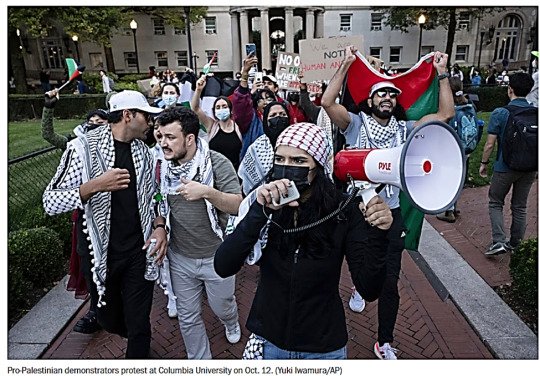
Originally posted 12/23/23; updated 12/24/23
This is a thought provoking article about how different U.S. generations perceive the current conflict between Israel and Hamas. To encourage people to read the entire article, this is a gift 🎁link so that anyone can read the article, even if they do not subscribe to The Washington Post.
Although I am from an older U.S. generation, I condemn the Netanyahu administration's decision to pursue Hamas at the unconscionable expense of tens of thousands Palestinian civilians, including many children.
However, reading this article helped me to also understand why, being born in the decade after the Holocaust, I don't absolve Hamas of their terrifying behavior on Oct. 7th--unlike many younger people seem to have done. Although I strongly oppose the apartheid Israel has imposed on the Palestinians (and I do believe that Palestine should have been a free separate state long ago), I still don't think there is any justification for such a terrorist act against Israeli civilians.
I encourage you to read the entire article, but here are a few excerpts:
Across more than two months of war between Israel and Hamas, public opinion on the conflict has continuously shifted. But there has been a constant: a divide between the views of older and younger Americans that has shown up both during the war and in the years leading up to it.
[...]
Each age group has a different “generational memory” of Israel, Dov Waxman,director of the UCLA Younes and Soraya Nazarian Center for Israel Studies, said. Beliefs about the world tend to form in our late teens and early 20s and often don’t change, he said.
Older generations, with a more visceral sense of the Holocaust, tend to see Israel as a vital refuge for the Jews, he said, and see its story as one of a people returning to safety in their homeland after living for 2,000 years as a scattered diaspora facing persistent persecution.
In the decades after its founding, Israel was a relatively lower-income and vulnerable country.
[...]
But by the time millennials began forming their understanding of global events, the violence of the second Intifada had concluded in the mid-2000s with enhanced walls and barriers constructed between Israel and the West Bank, and then Gaza. This generation formed its idea of Israel from reports of Palestinians denied access to water, freedom of movement and fair trials, under the military control of what was by then a relatively rich, nuclear-armed power.
“When I was in college it was the Oslo peace process, and I still remember that Israel — pursuing peace with the Palestinians and the hopes that came along with that,” Waxman said, of the ’90s. “Younger Americans have no memory of that.”
[See more excerpts from the article under the cut. Those excerpts are worth reading because they are quite thought provoking.]
A racial justice lens
Joey Ayoub, a Palestinian-Lebanese writer, podcaster and academic, says young Americans are more likely to conceptualize the Palestinian cause as a sister issue to U.S. efforts for racial justice. There is a “visual parallel,” he said: of an armed soldier or police officer dominating a space inhabited by a populace with limited power, whether in a town in the occupied West Bank or a majority-Black neighborhood in the United States.
[...]
Eitan Hersh, a political science professor at Tufts University, said conflict between Israel and Palestinians seems to be seen by the young left, especially on college campuses, as “a people of color — that is, the Palestinians — rising up against a white oppressor,” though a significant portion of Israel’s Jewish population is of a non-European background. (Some are the descendants of about 850,000 Jews who were expelled from Arab countries and Iran after Israel was founded.)
“It’s a bit of a curiosity,” he said. “One could tell an oppressor-oppressed story where the Jews, and Israel, is a story of the oppressed: kicked out of all these countries, going back to their homeland, surrounded by a broad set of dominant countries in the region that wants to destroy it.”
Shifting demographics
One explanation for the generational divide, experts said, was that fewer Gen Zers and millennials identify as conservative or Christian — demographics more likely to sympathize with Israel — than older groups.
[...]
Another “major factor” in older generations’ feelings toward Israel is their greater religiosity, according to Waxman. More than three-quarters of Americans 60-64 are Christian — with increasingly higher numbers for older brackets — compared with about half of adults under 30.
“It’s, I think, for many religious Christians, somehow a kind of atonement in supporting Israel and Zionism,” Waxman added. “Genuinely, a feeling of Israel as a consequence of this long history of Jewish persecution” by Christians.
Some Christians, particularly among evangelicals who are especially likely to sympathize with Israel, believe that Israel was promised to the Jews by God, and that the return of the Jews to Israel fulfills a biblical prophecy of the events that will precede the second coming of Jesus Christ.
But even outside of this belief, the idea of Israel as a sacred land for Judeo-Christians has an emotional resonance that is simply not present for the increasing number of secular young Americans.
[...]
Social vs traditional media
Dana El Kurd, a nonresident fellow at the Middle East Institute, said different types of media consumption have probably played a role in how people have formed their views on the Middle East.
Americans 45 and older are most likely to get their news from TV networks and their websites, and Americans younger than 45 are most likely to get their news through social media, according to 2022 YouGov polling.
The regular use of TikTok in particular is correlated with criticism of Israel, a New York Times/Siena poll found this week.
Ayoub, whose interview podcast “The Fire These Times” with Lebanese, Palestinian, Syrian, Jewish, and Armenian perspectives has mostly Gen Z and millennial listeners, said that new forms of media facilitated access between content creators and consumers without “having a gatekeeper.” This has downsides, including “a huge uptick in misinformation” online, he said, but also positives, including allowing traditionally underrepresented groups to reach an audience.
[...]
“I’ll give an anecdote,” El Kurd said. “My students, when the war broke out, said that they had gone onto TikTok and toggled between the different locations,” to see what kind of videos were popular in Israel compared with Gaza, the West Bank and other places. “It had never occurred to me before to do that.”
I encourage people to read the entire article.
I am strongly opposed to the apartheid that Israel imposed on the Palestinian population. But being from an older generation, I am also less likely to wholly embrace some of the (in my opinion) more simplistic generalizations that younger generations claim regarding Israel.
For instance, many younger people assume most Israelis are predominantly of white European ancestry, but there is evidence that about half the Israeli population is not of white European descent, including those who always lived in the region, those from Ethiopia and Northern Africa, and the descendants of the 20th century expulsion of 850,000 Jews from other nations in the Middle East.
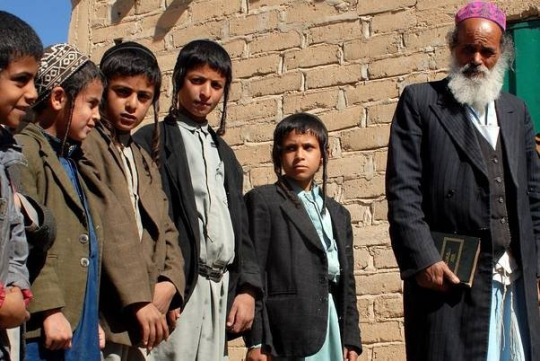

There are also some estimates that only 20% of the general gene pool in Israel is white European. This in turn leads to questions about the assumption of many younger people that white European Jews engaged in a "settler colonialism" of Israel. Still, some form of colonization DID happen, even if it might not fit a strict definition of "settler colonialism."
But it is important to remember that most of the Jewish colonizers around the time of Israel's founding were refugees who had survived the Holocaust, or were running from Eastern European pogroms/oppression, or who were expelled from Iran and Arab nations. What is tragic is that many of these Jewish victims of persecution and oppression and/or their descendants ended up implementing or supporting oppressive practices towards the Palestinians in their attempts to create a Jewish state where they could finally feel safe.
In many ways, all the nations of the world who oppressed and persecuted Jews for centuries have some responsibility for this mess. But that does not absolve the Israeli leaders from their oppressive choices towards Palestinians (especially their current choices that have resulted in the deaths of tens of thousands of Palestinian civilians)--just as Israeli oppressive behavior does not absolve Hamas leaders for their decisions to employ terrorist tactics against Israeli civilians on Oct. 7th.
Although I still support a two-state solution, I believe there are no easy fixes to this situation. The conflict, for both Israelis and Palestinians is an emotional powder keg fueled by thousands of years of transgenerational trauma (both within the region, and outside it in the case of the Jewish diaspora). This in turn affects the perceptions and responses of both Israelis and Palestinians. Sadly the current conflict has only added a new layer to the transgenerational trauma of both groups.
Anyway, after reading the above article, I realize that coming from an older generation, my perspective on the Israeli-Hamas conflict is different than the perspectives of some younger people. However, I still think there should be an immediate cease fire, and that the Biden administration should STOP supporting Israel, unless Israelis agree to end the fighting, fully support a rapid international humanitarian aid effort for the Palestinians in Gaza, come to the table to negotiate peace, and finally allow the creation of a free Palestinian state.
Originally posted 12/23/23; updated 12/24/23
#israel hamas conflict#generational differences in perception#israel#gaza#palestinians#frances vinell#the washington post#gift link
114 notes
·
View notes